Behaviour change needed to halt corruption – CHRAJ
 Mr Jaladeem Abdulai, Upper East Regional Director of the Commission on Human Rights and Administrative Justice ( CHRAJ), has said behavior change is needed to halt the culture of corruption in the society.
Mr Jaladeem Abdulai, Upper East Regional Director of the Commission on Human Rights and Administrative Justice ( CHRAJ), has said behavior change is needed to halt the culture of corruption in the society.
Mr Abdulai said corruption, which is a major setback to national development, went beyond offering money and gifts to obtain a favor and cited nepotism, favoritism, embezzlement, cronyism, absenteeism, habitual lateness to work and public functions, abuse of public property among others as some of the examples of corrupt practices exhibited by public officers.
The Regional Director said this when he delivered a paper on the topic “Understanding Corruption in Ghana’’, in Bolgatanga during the launch of the Transparency and Accountability for Higher Quality Education in West Africa (TAHQEWA) Project”.
The Project, which is aimed at inculcating anti-corruption behavior in pupils to help fight against corruption and funded by the Open Society Initiative for West Africa (OSIWA), is being implemented by the Ghana Integrity Initiative (GII) in collaboration with the National Commission for Civic Education (NCCE) in some selected basic schools across some districts in the country.
Mr Abdulai said these negative practices had a significant impact on national development and called for a holistic approach to deal with the canker.
He attributed the problem to the lack of enforcement of the various laws including the Public Procurement Act, 2003 (Act 720), the Economic and Organised Crime Act, the Financial Administration Act, 2003 (Act 654), the Internal Audit Agency Act, 2003 (Act 658), the CHRAJ Act, 1993(Act 456).
The Regional Director, who cited leakages of revenue as one of the major factors affecting revenue mobilization, stressed the need for the strict enforcement of the laws to help deal with the canker.
He disabused the minds of some Ghanaians that corruption was endemic and could be only be minimized and expressed optimism that with the implementation of TAHQEWA Project, the problem of corruption could be dealt with.
Mrs Mary Awelana Addah, Programmes Manager of GII , said the project was being implemented in three West African countries including Cote d’Ivoire, Ghana and Niger.
She said in Ghana, the project is being implemented in some selected basic schools across six districts, namely Asante Akyem South in the Ashanti Region, Gomoa East in the Central Region, the Bolgatanga Municipal in the Upper East Region, Assin South in the Central Region, the South Tongu in the Volta Region and the Berekum Disrict of the Brong Ahafo Region.
Mrs Addah said in the Upper East Region, the beneficiary schools were the Akantome Junior and the Sacred Heart Junior High Schools and noted that in all the selected schools in the country, twelve clubs would be established and members are expected to become ambassadors in championing anti-corruption behaviors.
She said the overall objective of the project was to promote the culture of zero tolerance for corruption in schools whilst instilling values such as integrity and patriotism in pupils, trigger social demand for transparency and accountability in education systems.
Mr Merdison Anane Amokase, the Municipal Director of Education, who lauded the GII and NCCE for the project, urged the pupils to become ambassadors of anti corruption in their respective schools and communities.
Source:GNA
